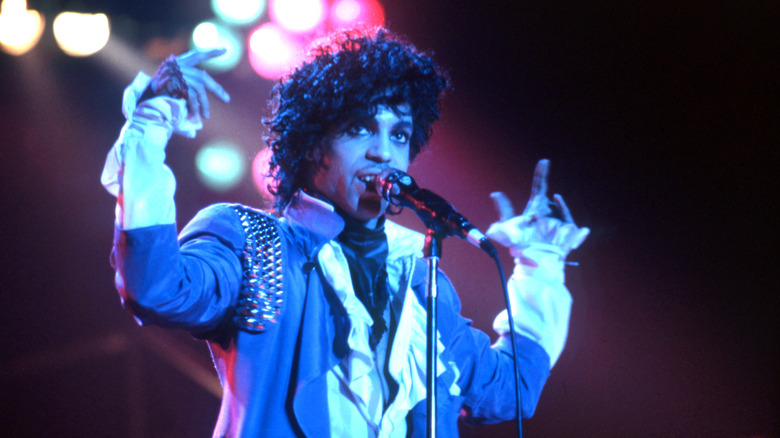Prince’s iconic song “When Doves Cry” remains an indelible part of pop music history. Released in 1984, its profound lyrics and haunting melodies continue to resonate with audiences across generations. However, when examined through a Christian lens, the lyrics offer a compelling exploration of human relationships, echoing themes of love, heartache, and the struggle for redemption. Within this context, one finds a tapestry enriched by numerous theological insights and reflections on the nature of love—both divine and human.
To begin, the very title of the song conjures an evocative image: doves, often symbolizing peace and purity, cry out—an unusual juxtaposition that suggests turmoil beneath a surface of tranquility. This conflict is echoed in the following lyrics, which articulate a struggle intertwined with romantic and familial dynamics. From a Christian perspective, such duality is reminiscent of the biblical concept of sin and grace. The cries of doves symbolize the anguish that often accompanies broken relationships or unfulfilled promises, while simultaneously hinting at the possibility of reconciliation and healing.
Throughout the song, Prince articulates poignant observations about the nature of love. The lyrics, “This is what it sounds like when doves cry,” suggest that the expression of genuine emotion can be an amalgamation of joy and sorrow, love and pain. In Christianity, love is often celebrated as a divine gift that can simultaneously uplift and wound. The trials and tribulations accompanying intimate relationships serve as reminders of our fallen nature and the necessity of grace. Just as doves symbolize peace, their cries may suggest that the path to genuine reconciliation often involves grappling with insecurities and suffering.
Further reflection on the lyrics reveals a deep yearning for connection in the midst of disconnection. The line, “You can’t be a lover if you don’t love yourself,” introduces a critical biblical principle – the necessity of self-love or self-acceptance as a precursor to loving others. In Matthew 22:39, Jesus commands us to “love your neighbor as yourself.” It implies that the love we offer to others is an extension of the love we cultivate within ourselves. Thus, Prince’s lyrics function as a poignant commentary on self-identity, self-worth, and the complexities they introduce into our relationships with others.
As the song unfolds, the lyrics delve into themes of familial relationships, particularly the complexities of parental love. Lines within the song evoke feelings of disappointment and longing, reflecting the Biblical narratives of familial strife found in the stories of Cain and Abel, Joseph and his brothers, and even the prodigal son. Such allusions are profound, as they resonate with the Christian believer’s understanding of the fractures that can occur even among those we hold dear. The challenge lies in navigating these relationships while maintaining faith and hope, both in others and in oneself.
Moreover, the metaphors employed in the song challenge listeners to confront uncomfortable truths about their lives. The struggle for understanding, as suggested in the lines of turmoil amidst love, reflects the inherent conflicts found in human experience. In the Gospel of John, Jesus acknowledges that “in this world, you will have trouble” (John 16:33), yet he invites us to find solace in his peace. This duality—a coexistence of suffering and hope—dovetails beautifully with the lyrical exploration presented in “When Doves Cry.” As listeners engage with these themes, they are prompted to reflect on their personal conflicts, perhaps prompting a shift in perspective regarding their own relationships.
Interestingly, the persistent motifs of fragmentation found in the song also beckon the faithful to contemplate the redemptive possibilities embodied in Christ’s love. Just as the “doves” represent both fragility and resilience, so too do they embody the promise of renewal. The Christian journey is one of transformation—navigating the brokenness towards wholeness. Prince’s lyrics resonate with this tension, inviting introspection about not only the nature of love but the pathways toward healing.
As the song progresses, it increasingly emphasizes the need for empathy and understanding within relationships. The repetition of phrases throughout “When Doves Cry” exemplifies the cyclical nature of pain and healing, akin to the cycles of life that emphasize growth through adversity. This notion aligns with the biblical understanding of perseverance, where James 1:2–4 teaches that trials produce steadfastness. The ability to empathize and embrace vulnerability within one another reflects a higher calling in love, an invitation to mirror the unwavering love that God demonstrates towards humanity.
Ultimately, “When Doves Cry” serves as more than a mere musical artifact; it functions as a poignant examination of love’s trials, the complexity of human emotions, and the necessity for redemption. The exploration of these themes through a Christian lens offers profound insights into the nature of our relationships with one another and with God. The tumult that arises from love reflects the broader spiritual struggle of humanity—a struggle that, when approached with faith, leads to the blossoming of true understanding and unity.
In conclusion, examining the lyrics of Prince’s “When Doves Cry” through the framework of Christian theology provides both a meaningful reflection on human relationships and a pathway for the faithful to seek reconciliation and understanding. The invitation within these lyrics encourages a journey toward not only personal insight but a communal longing for love, grace, and healing in our fractured world. In the end, as the doves cry, so too may their song lead to harmony and hope in the hearts of those who listen.



